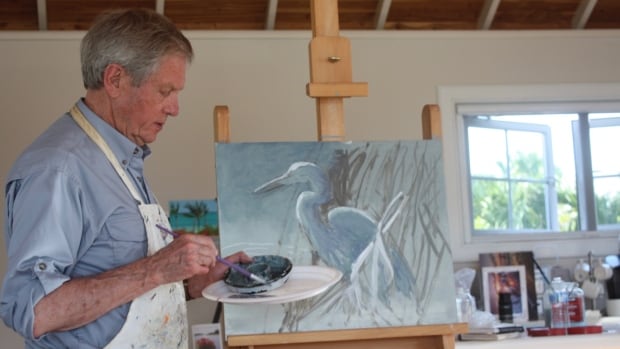Canadian artist Robert Bateman is known for his realistic paintings of wildlife and nature, every feather and each twig a reflection of what one would see.
But he hasn’t always painted that way. In his many years as an artist, he’s experimented with other styles.
Some of his work, from the 1940s until now, is being showcased in a new exhibition at the Penticton Art Gallery this month, entitled Unexpected Bateman.
Bateman, 94, started painting as a young boy and did his first “serious” painting at age 12 — an image of an elk.
“All little kids love doing art, but most normal human beings grow up around the age of 12 or so on and go on to more grown up, mature things,” he said during an interview on CBC’s North by Northwest. I just have not yet reached that stage.”
He never took art classes but spent time at the Royal Ontario Museum, where he fell in love with ornithology, the study of birds.
“The museum kids class would be over, but I would then go, and I’d made friends with some of the staff behind the scenes… and became kind of a museum groupie,” Bateman said.
As he entered his teens and then into his 20s, Bateman remembers gathering with friends — a group of teachers from the Ontario College of Art & Design — two or three times a year to sing folk songs, old classics like On Top of Old Smokey and You Are My Sunshine.
He used that connection to learn about “real art” and started painting more expressionist works — which, as a naturalist, he found unsatisfying.
“What is important to a naturalist is particularity,” he said.”I can’t just be a wild slap-on-paint artist and be a naturalist.”

Art over nature
Nature has always been a big part of Bateman’s life, but he’s ever so slightly more committed to art than to nature.
This is apparent in his painting, Red-winged Blackbirds & Rail Fence, from 1978. As noted on his website, once he finished the painting, an ornithologist friend told him the dominant bird would not normally allow itself to get below the subdominant bird — as shown in his painting.

“This scientific flaw bothers me, but not enough to change the composition. I always try to reconcile art and nature in my paintings, but if I had to choose between them, I would choose art,” he said on his website.
Earlier this year, he told Canadian Geographic that he considers himself 51 per cent artist and 49 per cent naturalist.
“If I ever have a conflict between art and nature, I let art win,” he told CBC. “I will distort nature a bit for the sake of the composition or the contrast or whatever I’m after, but they’re so close to being equal it really doesn’t matter.”

Sharing nature with family
Aside from art, nature is number one, and he endeavours to share that passion with his family.
Bateman has five children, who he said he often travelled with when they were growing up.
As they drove across the country, the kids would get rewards for identifying birds.

Now a grandfather, he tries to keep his grandchildren’s eyes on nature instead of screens.
“I tell them I don’t approve of spending a lot of time indoors on screens,” he said. “I don’t want to see them on a screen. They can’t be blatant about it. Maybe they’re secretive about it, but I think it’s a bad thing, and I think they should be outdoors or looking outdoors.”
If we don’t pay attention to nature, Bateman worries our ecosystems could disappear without anyone realizing.
“It enriches your life so much to be looking out at what is happening in the world. We’re especially lucky in Canada,” he said. “How the seasons change, how the first pussy willows are starting to come out and all these wonderful little events that take place. If you’re just looking at a screen, you’re missing out on what the world is.”

At 94, he said he won’t stop painting until the end.
“I’m sure they will carry me out,” he said with a laugh. “You’ll see my hands still flickering. It’s something I’ve always done. I can’t not do it.”
Ever the humble painter, Bateman said it would be “pretentious” of him to assume he’ll leave a legacy but hopes he can inspire others to care about the planet.
“If I do, it would be to get people to pay attention to the world of nature and what we’re doing to it.”
LISTEN | Robert Bateman on nature, art and his legacy
North by Northwest16:02Iconic artist Robert Bateman on his upcoming retrospective exhibition in Penticton
Iconic artist Robert Bateman joins NXNW from his home on Saltspring Island to talk about his upcoming retrospective exhibition, Unexpected Bateman, at the Pentiction Art Gallery.


